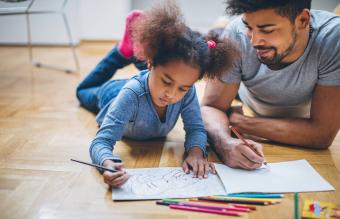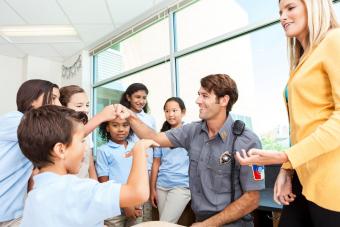
While public school and homeschooling have vast differences, in the end it's really all about ensuring that our children have the best possible education we can provide for them. There are loads of factors that go into making this decision, and while statistics for homeschooling vs. public schooling can help, no two families are alike. Consider everything that will affect your child, your family, and your own mental and physical load to ensure that you're making the best choice for everyone involved.
Academics
There are lots of different ways to indicate "success" in education, but it's tough to argue with hard academic numbers. We have made every attempt to secure these stats from the most current sources available, but we also strongly recommend continuing with your own research to verify and broaden your scope. Also note that the following stats are specific to the U.S.A. unless otherwise noted.
According to YourDictionary, the term "home school" means, "To instruct (a pupil, for example) in an educational program outside of established schools, especially in a home."
Consistently Higher Percentile Scores
According to the National Home Education Research Institute (NHERI), based on a May 2024 report, homeschooled kids score about 15-25 percentile points higher than public school students on standardized tests, which is slightly lower than a report from 2014 which placed them 15-30 percentile points higher. This study further concludes that these results were achieved regardless of income level within the students' families or educational status of the students' parents.
Learning Efficiency
The Home School Legal Defense Association (HSLDA) presents a 2024 study that looks at the amount of time homeschooled students spend learning, versus their public school counterparts. The conclusion reached here is that homeschooled kids can learn in about 2-2.5 hours the same amount as those in public school spend an entire day learning. This is, according to the article, due to inefficiences and distractions in the public classroom setting.
The Other Side of the Story
As noted on Homeschool Success, looking at SAT and ACT scores and comparing between home schoolers and public schoolers is really unfair. Many kids who are homeschooled do not opt to take these tests, and in some states, the tests are mandatory in public school. So it's difficult to get a realistic comparison between all public school kids and a select group of home schooled kids. However, they do point out that those who are homeschooled do not have any discernible disadvantages here.
Math Gap
The Coalition for Responsible Home Education found that there was a "math gap" between home educated students and public school students, with the public school students coming out on top in this academic area. The researchers concluded that, while it was a fairly straightforward task for most responsible parents to teach reading, writing, science, and social studies, many parents would struggle with teaching a challenging math curriculum.
Socialization
Recent research is changing opinions about how well socialized home-schooled children are. While there is still a common misconception that home-schooled children may be more poorly socialized than their publicly educated peers, this may not be the case. In fact, home educated students have many opportunities for social interaction beyond the classroom.
Above Average Social Skills
In the same study referenced above, NHERI claims that home-schooled children's scores of social, emotional, and psychological well-being are above average. They cite that 87% of studies back up this claim.
In 2003, the HSLDA commissioned another study called Homeschooling Grows Up, which used a sample of volunteer former home-school students to interview and collect data from. The results stated that homeschooled children were just as well socialized as their public school peers.
The Other Side of the Story
Critics of the HSLDA study note that there are two major issues with both the study and its findings. The Coalition for Responsible Home Education (CRHE) points out that the questions used in the study were not necessarily the best options to determine how well socialized the subjects are. Perhaps more significantly, however, the students surveyed had signed up to do so, thereby limiting the data pool to those who were outgoing enough to want to participate.
In a 2014 study conducted by Help A Reporter Out (HARO), about 25% of respondents claimed poor or very poor socialization as a result of being homeschooled. Furthermore, a 2021 study for EdChoice, called Homeschooling Market Survey Analysis, notes that 44% of responding parents agreed "a moderate amount" or "a great deal" to the statement, "my child has not been able to socialize as much as I would like." A further 24% responded "occasionally" to this statement.
College Admissions
According to a 2016 article from NBC News, although the number of home educated students applying to traditional colleges is still small, the numbers are growing and acceptance rates are improving. The report suggests that college admissions officers and deans find the home-schooled students' portfolios to be more extensive and more "innovative" as compared to their peers.
To further this point, a 2015 article on businessinsider.com highlights the Harvard acceptance story of one home educated student. The article praises the positive aspects of home-schooling such as the opportunities for students to attend high-level classes at colleges, study subjects of their choice in depth, and involve the community in their educational journey. This, the article explains, is what makes home educated students stand out from their peers and become appealing to admissions officers.
Homeschoolsuccess.com reports college acceptance statistics for the 2015/2016 year for home educated students at these top ranked schools as being between 4% (Stanford) and 17% (Williams). Although this seems low, the 2016 statistics for acceptance across the board at these two colleges is 4.69% (Stanford) and 17.3% (Williams) suggesting that home-schooled students have the same chance as their peers to attend an Ivy League college of their choice.
St. John's College currently states that about 10% of their students are homeschooled, while MIT says that homeschooled students make up fewer than 1% of their current student population and applicants, though they also point out that this number is growing.
The Other Side of the Story
Home-schoolers hoping for acceptance into Ivy League colleges will need to ensure that their extracurricular talents and test scores set them apart from the crowd. All applicants must meet the same standards to get into the college of their choosing.

Home-Schoolers Become Adults
NHERI suggests that home-schooled students become successful adults, indicating that they are frequent participants in community and public service projects.
The Other Side of the Story
The Coalition for Responsible Home Education, however, warns that feedback from adults who were home schooled in their youth suggests that the type of homeschooling received is crucial. Adults who were subject to an inferior or neglectful home-school environment had substandard levels of social interaction, faced poor job prospects, and experienced generalized life struggles.
The 2011/2012 Cardus Education Survey, although designed to study adult graduates of Christian schools in the U.S. and Canada, also surveyed adult graduates of religiously minded home-schools. The survey discovered that these young adults reported feelings of "helplessness in dealing with life's problems and of lack of clarity of goals and sense of direction."
Home School Vs Public School: Which Is Better?
It is important to note that one model does not fit all. There is no "right" answer in the public school vs. home-school debate. Although there is ever-increasing data to support the effectiveness of homeschooling, it is crucial to remember that while one child will benefit from this method, another might receive support from the social and structured atmosphere found at a traditional school. Consider your child's learning style and go from there. It is not necessarily a question of what is better or what is worse but a question of what is right for your family. All parents interested in their child or children's education should be supported regardless of the educational methods they ultimately decide to choose.







